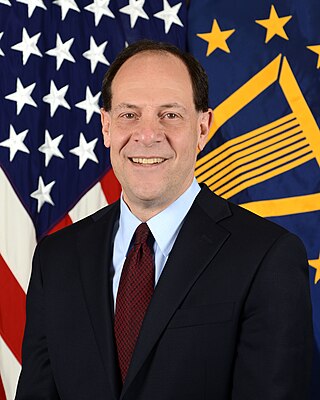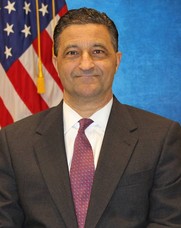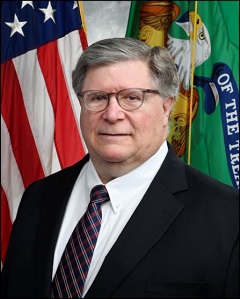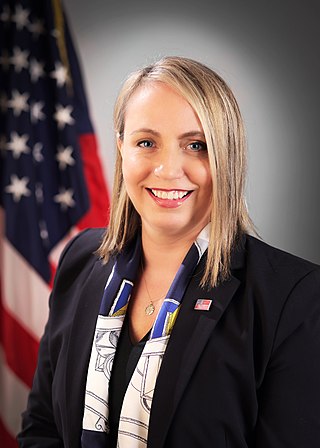
The Hatch Act of 1939, An Act to Prevent Pernicious Political Activities, is a United States federal law. Its main provision prohibits civil service employees in the executive branch of the federal government, except the president and vice president, from engaging in some forms of political activity. It became law on August 2, 1939. The law was named for Senator Carl Hatch of New Mexico. It was most recently amended in 2012.

The 116th United States Congress was a meeting of the legislative branch of the United States federal government, composed of the Senate and the House of Representatives. It convened in Washington, D.C., on January 3, 2019, and ended on January 3, 2021, during the final two years of Donald Trump's presidency. Senators elected to regular terms in 2014 finished their terms in this Congress, and House seats were apportioned based on the 2010 census.

Glenn Alan Fine is the former principal deputy Inspector General of the Department of Defense and former Acting IG of the Department of Defense. Fine previously served as the Inspector General of the United States Department of Justice (DOJ) from 2000 until January 2011. He was confirmed by the United States Senate on December 15, 2000. Prior to his appointment as the DOJ Inspector General, Fine served as Special Counsel to the DOJ Inspector General from January 1995 until 1996, when he was made Director of the OIG's Special Investigations and Review Unit.

The Department of Defense Inspector General (DoDIG) is an independent, objective agency that provides oversight related to the programs and operations of the United States Department of Defense (DoD). DoD IG was created in 1982 as an amendment to the Inspector General Act of 1978.

Steven Andrew Engel is an American lawyer. He served as the United States Assistant Attorney General for the Office of Legal Counsel in the Donald Trump administration. Engel, who previously worked in the George W. Bush administration as Deputy Assistant Attorney General in the Office of Legal Counsel, was nominated by President Donald Trump on January 31, 2017, and confirmed on November 7, 2017. On January 20, 2021, he was succeeded by Christopher H. Schroeder, serving under the Biden Administration.

Stephen Elliott Boyd is an American lawyer who served as the United States Assistant Attorney General for the Office of Legislative Affairs from 2017 to 2021.

Michael Kevin Atkinson is an American attorney. He worked for the United States Department of Justice for approximately 15 years, before becoming the second Inspector General of the Intelligence Community. He assumed office on May 17, 2018.

Joseph Vincent Cuffari is an American government administrator who has been the Inspector General of the U.S. Department of Homeland Security since 2019. He previously held positions in the Air Force Office of Special Investigations and Department of Justice Office of the Inspector General. Cuffari was also a policy advisor to Arizona Governors Jan Brewer and Doug Ducey.

The Coronavirus Preparedness and Response Supplemental Appropriations Act, 2020 is an act of Congress enacted on March 6, 2020. The legislation provided emergency supplemental appropriations of $8.3 billion in fiscal year 2020 to combat the spread of coronavirus disease 2019 (COVID-19) and counter the COVID-19 pandemic, particularly the COVID-19 pandemic in the United States. The legislation passed the House 415–2 on March 4 and the Senate 96–1 on March 5, 2020. The legislation received broad bipartisan support.

The Coronavirus Aid, Relief, and Economic Security Act, also known as the CARES Act, is a $2.2 trillion economic stimulus bill passed by the 116th U.S. Congress and signed into law by President Donald Trump on March 27, 2020, in response to the economic fallout of the COVID-19 pandemic in the United States. The spending primarily includes $300 billion in one-time cash payments to individual people who submit a tax return in America, $260 billion in increased unemployment benefits, the creation of the Paycheck Protection Program that provides forgivable loans to small businesses with an initial $350 billion in funding, $500 billion in loans for corporations, and $339.8 billion to state and local governments.
The United States House Select Subcommittee on the Coronavirus Pandemic, formerly the Select Subcommittee on the Coronavirus Crisis, is a bipartisan United States House of Representatives select subcommittee that Speaker Nancy Pelosi has announced will be created to provide congressional oversight of the Trump administration's response to the COVID-19 pandemic in the United States. The Select Subcommittee was established under H.Res.935 during the 116th Congress. Pelosi announced on April 2, 2020, that the committee will oversee the $2.2 trillion economic stimulus/rescue legislation enacted by Congress. The Act created a $500 billion bailout fund for U.S. industry and is the largest economic emergency legislation in U.S. history. It will be a special investigatory subcommittee under the House Oversight Committee.

Brian D. Miller is an American attorney who serves as the Special Inspector General for Pandemic Recovery (SIGPR). In this role, Miller oversees the United States Department of the Treasury's implementation of the Coronavirus Aid, Relief, and Economic Security Act.
The Pandemic Response Accountability Committee (PRAC) is an independent oversight committee within the Council of the Inspectors General on Integrity and Efficiency, created by the Coronavirus Aid, Relief, and Economic Security (CARES) Act of 2020 to ensure that the $2.2 trillion of the CARES act, plus 5 other pandemic-related pieces of legislation totaling over $5 trillion in government funds, were not misspent.
The COVID-19 Congressional Oversight Commission (COC) is an oversight body in the United States created by the CARES Act. They will report to Congress every 30 days on how the Department of the Treasury and the Federal Reserve Board manage the funds until September 30, 2025. These reports will assess:

Bharat Ramamurti is an American attorney and political advisor who is serving as a member of the COVID-19 Congressional Oversight Commission, a congressional oversight body tasked with overseeing the Department of the Treasury's and the Federal Reserve Board's management of stimulus and loan programs mandated by the CARES Act. In 2020, he was chosen to serve as Deputy Director of the National Economic Council.

Paycheck Protection Program and Health Care Enhancement Act is a $484 billion law that increases funding to the Paycheck Protection Program and also provide more funding for hospitals and testing for COVID-19.

Christi A. Grimm is an American government official who has served as the Inspector General in the United States Department of Health and Human Services since February 2022.
In April and May 2020, United States President Donald Trump dismissed the inspectors general (IGs) of five cabinet departments in the space of six weeks. The inspectors general removed were Michael K. Atkinson, Intelligence, on April 3; Glenn Fine (acting), Defense, April 7; Christi Grimm (acting), Health and Human Services, May 1; Mitch Behm (acting), Transportation, May 15; and Steve Linick, State, May 15. In four of the cases the announcement was made late on a Friday night in a classic Friday news dump. In several cases the fired IGs had taken an action which Trump disliked, so that the dismissals were widely described as retaliation. In two other cases, questions were raised about whether the dismissals related to ongoing IG investigations into the conduct of the cabinet secretary in charge of that department. The cumulative firings were often described as a "purge" or as a "war on watchdogs".

The Consolidated Appropriations Act, 2021 is a $2.3 trillion spending bill that combines $900 billion in stimulus relief for the COVID-19 pandemic in the United States with a $1.4 trillion omnibus spending bill for the 2021 federal fiscal year and prevents a government shutdown. The bill is one of the largest spending measures ever enacted, surpassing the $2.2 trillion CARES Act, enacted in March 2020. The legislation is the first bill to address the pandemic since April 2020. According to the Senate Historical Office, at 5,593 pages, the legislation is the longest bill ever passed by Congress.

The American Rescue Plan Act of 2021, also called the COVID-19 Stimulus Package or American Rescue Plan, is a US$1.9 trillion economic stimulus bill passed by the 117th United States Congress and signed into law by President Joe Biden on March 11, 2021, to speed up the country's recovery from the economic and health effects of the COVID-19 pandemic and the ongoing recession. First proposed on January 14, 2021, the package builds upon many of the measures in the CARES Act from March 2020 and in the Consolidated Appropriations Act, 2021, from December.












